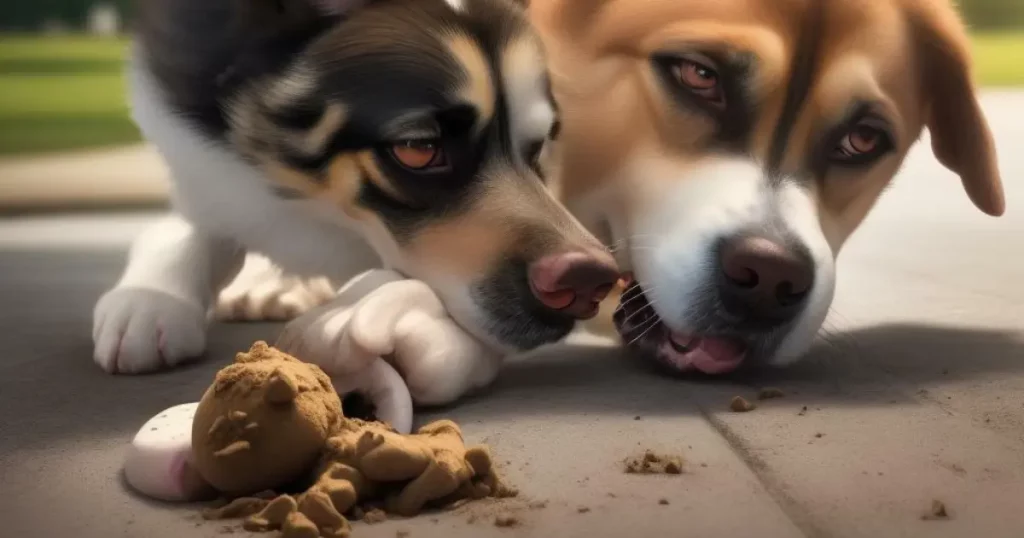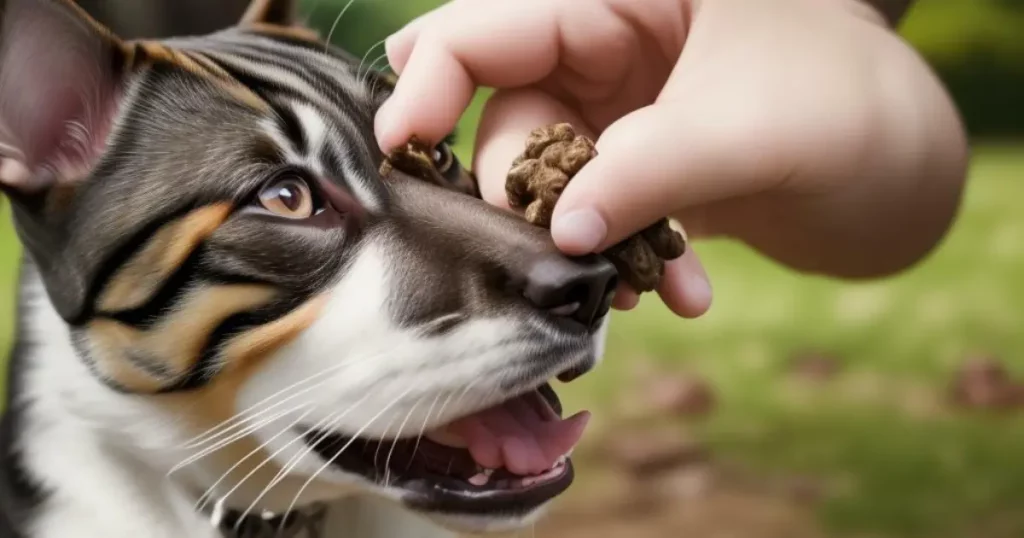What to Do if Your Dog Eats Cat Litter?
Dog Eats Cat Litter : Navigating the world of pet ownership often comes with unexpected hurdles. If you’ve found yourself in a situation where your dog has consumed cat litter, you’re likely scouring the internet for a definitive guide on what steps to take next. Thankfully, you’ve landed in the right place. Let’s dive in.
Immediate Actions to Take
Time is of the essence. First, identify the type of cat litter your dog has ingested. The various kinds—clumping, non-clumping, silica, and natural—all have different impacts on a dog’s digestive system.
- Clumping Litter: Could cause blockages; seek immediate vet assistance.
- Non-Clumping Litter: Less severe but still warrants a vet check-up.
- Silica Litter: Contains small pores that absorb moisture, and can be harmful.
- Natural Litter: Least harmful but may cause gastrointestinal irritation.
Call your vet right away to discuss symptoms and determine whether an immediate visit is necessary.

Symptoms to Watch For
While waiting for professional advice, keep a close eye on your dog. Symptoms could manifest quickly or may take a few hours to become apparent.
- Vomiting or Gagging: An immediate reaction to the foreign substance.
- Lethargy: A sign that your dog is struggling with the ingested material.
- Diarrhea or Constipation: Watch for any change in bowel movements.
- Abdominal Pain: Your dog may whine or show discomfort when you touch their belly.
Vet Examination: What to Expect
Once you reach the vet, they will likely conduct a series of tests to determine the severity of the issue. Ultrasounds, X-rays, and blood tests are frequently utilized diagnostic techniques. Surgical intervention or induced vomiting may be necessary for your dog, depending on the sort and quantity of litter they have consumed.

Preventive Measures for the Future
Accidents happen, but we can take steps to avoid repeating them.
- Store Litter Properly: Keep cat litter in a location inaccessible to your dog.
- Train Your Dog: Use commands like “leave it” to discourage your dog from approaching the litter.
- Closely Monitor Multi-Pet Homes: Keep an eye on all pets when they are in the same area.
Consult with Pet Insurance Providers
Should you find yourself in a similar situation again, having Pet insurance can alleviate financial stress. Many insurance providers cover accidents like ingestion of foreign substances, so it’s wise to compare policies and invest in one that suits your needs.
Other Articles
- Urban Dog House Design Trends: Stylish Living for Your Pooch
- The Dog House Grooming Essentials for Every Dog Owner
- Modern Dog Houses: The Perfect Blend of Comfort and Contemporary Design
- Boucle Dog Beds: A Stylish Addition to Your Home Décor
- Baby Animal Names From A to Z, Cute Names for Young Creatures
Summary: Steps for a Safe and Swift Resolution
- Identify the type of litter ingested and call your vet immediately.
- Monitor for symptoms such as vomiting, lethargy, or changes in bowel movements.
- Follow the vet’s advice and complete any recommended tests or procedures.
- Take preventive measures to avoid future incidents.
By following these comprehensive steps, you are well on your way to managing this stressful situation with the least amount of harm to your beloved pet.
The Importance of a Quick Response
Speed is crucial in these scenarios. Every minute counts when your dog has ingested a foreign substance like cat litter. Immediate action can mean the difference between a minor upset and a major health crisis. While it’s easy to panic, remember that time spent worrying is time lost. Take decisive steps to get your pet the medical attention it needs.

Follow-Up Care: The Road to Recovery
After the immediate crisis is over, your responsibilities as a pet owner are not. Your vet will likely provide a detailed treatment plan, which could include medications, dietary changes, and even follow-up appointments. Adhering to this plan is crucial for your dog’s complete recovery.
- Administer Medication: If prescribed, ensure that the full course is completed.
- Monitor Diet: Temporary dietary restrictions may be in order. Stick to them.
- Regular Vet Visits: Return for follow-up appointments to ensure full recovery.
Community Resources: Don’t Go It Alone
You’re not the first owner to deal with this, and you won’t be the last. Take advantage of community resources to share experiences and get advice.
- Pet Forums: Plenty of online forums are packed with information and experiences shared by other pet owners.
- Social Media Groups: Specialty groups on platforms like Facebook can be invaluable.
- Local Pet Care Workshops: These often cover a range of topics including first aid for pets.
Additional Reading
For those interested in diving deeper into pet health, consider looking into:
- Books on Pet First Aid: Knowledge is power. Empower yourself.
- Veterinary Blogs: Many vets share their insights online, and it’s free information right at your fingertips.
- Pet Health Podcasts: Great for those who prefer auditory learning.
Being educated not only prepares you for emergencies but also enriches your overall experience as a pet owner.
Dealing with Special Cases: Puppies and Older Dogs
Not all dogs are the same, and it’s particularly important to be extra vigilant if the dog in question is a puppy or a senior. Younger dogs have more sensitive digestive systems, and their natural curiosity makes them more prone to eating things they shouldn’t.
- Puppy-proof Your Home: Until they learn better, make sure dangerous substances are out of reach.
- Older Dogs: With age, certain health issues become more prominent. An older dog may have existing conditions that complicate the situation.

A Holistic Approach: Beyond Medical Treatment
Beyond immediate medical care, consider holistic approaches for long-term wellbeing.
- Nutritional Supplements: Probiotics and digestive enzymes can aid recovery.
- Natural Therapies: Techniques like acupuncture can sometimes alleviate symptoms.
- Behavioral Training: Work with a certified dog trainer to instill better habits.
Exploring Tech Solutions for Pet Safety
In our increasingly connected world, tech solutions can play a role in pet safety.
- Pet Cameras: Keep an eye on your pets when you’re not around.
- Smart Feeders: These can be programmed to dispense food at specific times, reducing the likelihood of your pet looking for alternative food sources like cat litter.
Vet-Approved Products for Safety and Prevention
Some preventative measures can be achieved through vet-approved products:
- Pet Fences: Keeps dogs away from designated areas like cat litter boxes.
- Pet-Proof Containers: Use these to store cat litter, ensuring it is absolutely out of reach.

Legislation and Pet Safety
As a responsible pet owner, it’s also beneficial to stay updated on local and federal legislation concerning pet safety. Laws can change, and being unaware could lead to inadvertent violations that jeopardize your pet’s wellbeing.
Final Thoughts: Your Role as a Responsible Pet Owner
Ultimately, your response to your dog eating cat litter speaks volumes about your responsibility as a pet owner. You may successfully handle this situation and stop others by taking prompt action, keeping an eye on things constantly, and providing careful follow-up care.
Being informed and prepared can make all the difference in these high-stakes situations. So keep emergency vet contact information easily accessible, be aware of the symptoms, and know the steps for immediate and follow-up care. Your quick thinking and action will go a long way in ensuring your pet’s health and wellbeing.
Conclusion: Knowledge is Your Best Tool
Being equipped with accurate and comprehensive information is your best defense against accidents. The more information you have, the faster you can take action and the better your dog will do. Following this advice has not only helped you address the immediate problem, but it has also given you the knowledge you need to avoid similar ones in the future.
We hope this guide has been invaluable in navigating the stressful scenario of a dog eating cat litter. Take these guidelines to heart, and you’ll be well-prepared for any pet emergencies that come your way.

